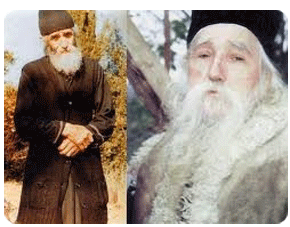
Elder Ioanichie Balan of Sihastria 1930-2007
On the way toward Karyes we made a short stop at the cell of the renowned hesychast, Paisios the Athonite, a great holy man, honored and sought out in the whole ofGreece, who amazed us with his holiness and humility.
The cell of Fr. Paisios in Capsala is surrounded by grape vineyards. We knocked at the gate and waited. A monk small of stature, thin, modestly clothed, about seventy-five years of age, but luminous of face and full of humility, came and opened the gate for us. It was the Elder!
“Bless us, Fr. Paisios! We are pilgrims from Romania.”
“The Lord bless us all!”
He invited us into a small chapel next to the cell, where we venerated and sang the Axion to the Mother of God. Then he invited us into his cell for guests, about eight by twelve feet. We sat down. There were about ten of us in all. Fr. Paisios served us, according to the custom of Athonite monks, with sweets and cold water. Then he sat on a small chair on the threshold of the door.
“Fr. Paisios, we come from far away. Please – give us a profitable word.”
“Forgive me, please. I am not hieromonk and I do not dare to give a profitable word to priests,” answered the Elder.
“Nevertheless, find for us a profitable word.”
“Fathers, I have not yet finished the school of monasticism and I don’t know many words.”
Seeing his humility, Archimandrite Cleopa asked him, “Fr. Paisios, which prayer is more beneficial for a monk: to read the Psalter or to say the Jesus Prayer?”
“Both are good,” he answered, “only say them from the heart, with faith and with tears.”
“Which monastic ascetical labor is better? Common life or that of the wilderness [desert-dwelling]?”
“If you have humility,” the Elder said, “in either you can be saved. He who wants to be sure of salvation enters into a community under obedience; and he who loves stillness and prayer withdraws in solitude.”
“How can we help in the salvation of others?”
“Through prayer. The monk is first of all a man of prayer and a candle on the candlestand for everyone. Only in this way can we help and spiritually build up people. First is prayer, then the example of our life, then the word of instruction.”
“How can we obtain the gift of tears?”
“If we have the humility of the saints, we will obtain both the Prayer of the Heart and the gift of tears. I haven’t been able to obtain this gift, which is received from God by great labor.”
“What opinion do you have of Athonite monasticism today?”
“I don’t have any opinion. But I know that all came to theHolyMountainto glorify God and to be saved. Thus all force themselves, according to their zeal and their strength, in prayer, in obedience, in fasting, in nightly vigils, and in all good works. All humble themselves, have hope, and labor and follow Christ. Who, however, will lay hold of the crown of salvation, no one knows except God alone.”
“What books must monastics read?”
“First of all the Holy Scriptures. Then the Lives of the Saints and the Patristic writings. We do not have to read or speak a lot, but we must do a lot!”
“Fr. Paisios, how many times must we partake of Holy Communion per year?”
“The promptings of the heart and our spiritual father indicate to us how many times. Some more often, others less often. But if monastics can commune once a week, it is very good. Lay people – less frequently and in accordance with what their spiritual fathers decide.”
“What other counsel can you give us?”
“Let us always be ready for death because we know neither the day nor the hour wherein the Son of Man cometh (Mat. 25:13)”
“Fr Paisios, how many hours must a monk sleep at night?”
“If I added up how many hours I sleep lying down on a bed and how many I sleep on my feet, you would see that I sleep all day long, because I don’t keep watch with my mind in prayer!”
And we benefiting greatly from the humility and wisdom of Fr. Paisios, thanked him for receiving us and for the counsel given, asked for his blessing, and continued on our way.
(Shepherd of Souls: The Life of Elder Cleopa, Chap. 56 The Pilgrimage to Mount Athos pp. 146-149).
Source: http://classicalchristianity.com/category/bysaint/blessedeldercleopaofilie19121998/
Our visitors also read the following:













 Login
Login